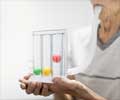A nutritional supplement popularly known for boosting athletic performance and muscle strength does not improve exercise outcomes in patients with chronic obstructive pulmonary disease
A new study says that patients with chronic obstructive pulmonary disease (COPD), are not helped by a nutritional supplement popularly known for boosting athletic performance and muscle strength.
The randomized, placebo-controlled, double blind study provided the most powerful evidence to date that the effect of Creatine (Cr) supplementation was negligible at best among these patients."We have evidence to suggest Cr uptake into muscles [in COPD patients] but are unable to explain why an increase in muscle Cr did not enhance training," wrote the study's lead author, Sarah Deacon, M.D., specialist registrar at the Institute for Lung Health at Glenfield Hospital in Leicester, England.
The results were published in the first issue for August of the American Journal of Respiratory and Critical Care Medicine by the American Thoracic Society (ATS).
Cr supplementation has been shown to improve short-burst, high-intensity exercise function in athletes, as well as enhancing isometric muscle strength, lower body endurance and lean body mass in the elderly.
To determine whether Cr supplementation could similarly enhance the physical condition of COPD patients, Dr. Deacon and co-researchers recruited 100 patients with COPD to either receive Cr or a placebo over the course of a seven week pulmonary rehabilitation program.
Those who were randomized to the placebo group were give lactose supplements that appeared identical to the Cr-containing supplements. Following a five-day loading period each subject followed maintenance dosing of 3.76 or 4 g of Cr or lactose respectively.
Advertisement
The Cr group also showed a greater, but non-significant percentage of improvement in the incremental shuttle walking test with loading and after pulmonary rehabilitation, but additional analysis still showed no overall effect between it and the placebo group.
Advertisement
This study, therefore, further validates that there is no substitute for the old-fashioned hard work that is an essential element of pulmonary rehabilitation.
Source-ANI
RAS/L















